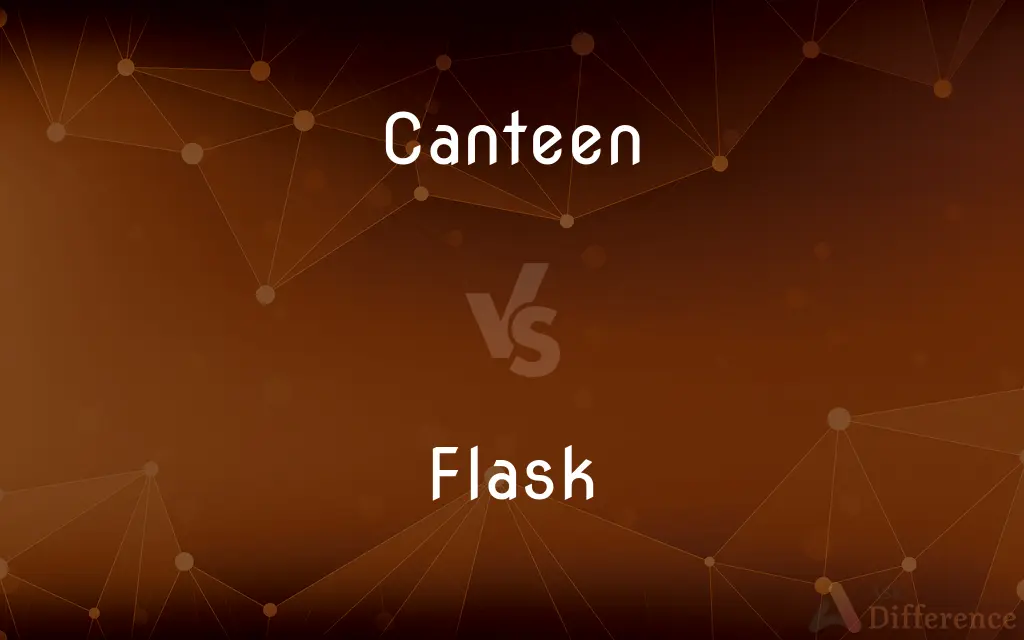Canteen vs. Flask — What's the Difference?
By Tayyaba Rehman & Fiza Rafique — Updated on March 25, 2024
A canteen is a container for carrying water or other drinks, often used in outdoor activities, while a flask is a smaller, more portable vessel for liquids, typically designed to fit in a pocket and often used for alcoholic beverages.

Difference Between Canteen and Flask
Table of Contents
ADVERTISEMENT
Key Differences
Canteens are designed to hold larger quantities of liquids, making them ideal for hikers, soldiers, or anyone needing hydration over extended periods outdoors. They often come with straps or handles for easy carrying. Flasks, on the other hand, are smaller, sleek vessels designed for convenience and discretion, typically used to carry alcoholic beverages. Their compact size allows them to be easily concealed or fitted into a pocket.
Canteens are commonly made from durable materials like plastic, stainless steel, or aluminum to withstand outdoor conditions, whereas flasks are usually made of stainless steel or sometimes leather-wrapped, focusing on durability as well as style. The material choice for flasks also helps preserve the taste and quality of the contents, especially when storing spirits.
The primary function of a canteen is to provide a practical solution for staying hydrated, especially in environments where water sources are scarce. Flasks, however, serve a more social or personal purpose, allowing individuals to carry and consume alcoholic beverages discreetly in settings where doing so might otherwise be socially frowned upon or inconvenient.
While canteens are often associated with outdoor activities, military use, or institutional settings like schools and camps, flasks carry a more personal and individual connotation, often linked to personal choice and lifestyle. The design of flasks, with their slim profile and sometimes personalized exteriors, reflects a blend of functionality and personal expression.
Comparison Chart
Primary Use
Carrying water or drinks for hydration
Carrying alcoholic beverages discreetly
ADVERTISEMENT
Size
Larger, varying capacities
Smaller, designed for pocket-fit
Material
Plastic, stainless steel, aluminum
Stainless steel, leather-wrapped
Design Purpose
Durability for outdoor activities
Durability, style, and discretion
Connotation
Outdoor activities, military, institutional use
Personal use, lifestyle, social occasions
Compare with Definitions
Canteen
A flask or bottle with a shoulder strap or handle.
He slung the canteen over his shoulder before starting the trail.
Flask
A vessel usually made of stainless steel with a narrow neck.
She gifted him a personalized flask for his birthday.
Canteen
An establishment providing food and drink for organizations.
The company canteen offers a variety of healthy options.
Flask
Used for holding liquids, especially for laboratory use.
The scientist measured the solution in a glass flask.
Canteen
A place within an institution where drinks and snacks are sold.
The students gathered at the school canteen during lunch break.
Flask
A compact, pocket-sized bottle.
The flask fit perfectly in her purse, making it easy to carry.
Canteen
Military term for a portable water container.
The soldier's canteen was essential for staying hydrated.
Flask
Often a personal or gift item, sometimes engraved.
The engraved flask bore his initials, making it a special keepsake.
Canteen
A container for carrying drinking water or other beverages.
She filled her canteen with water before the hike.
Flask
A small container used to carry alcoholic beverages discreetly.
He kept a flask of whiskey in his coat pocket for cold nights.
Canteen
A small water bottle, as used by soldiers or campers.
Flask
A container for liquids.
Canteen
A restaurant provided by an organization such as a college, factory, or company for its students or staff.
Flask
An extremely strong lead-lined container for transporting or storing radioactive nuclear waste.
Canteen
A specially designed case or box containing a set of cutlery.
Flask
Short for powder flask
Canteen
A snack bar or small cafeteria, as on a military installation.
Flask
A flat, relatively thin container for liquor.
Canteen
A recreational facility, bar, or small general store formerly established for the patronage of soldiers.
Flask
A container or case for carrying gunpowder or shot.
Canteen
A recreation hall or social club where refreshments are available.
Flask
A vial or round long-necked vessel for laboratory use.
Canteen
A temporary or mobile eating place, especially one set up in an emergency.
Flask
A frame for holding a sand mold in a foundry.
Canteen
A usually metal container for carrying drinking water, as on a hike.
Flask
A narrow-necked vessel of metal or glass, used for various purposes; as of sheet metal, to carry gunpowder in; or of wrought iron, to contain quicksilver; or of glass, to heat water in, etc.
Canteen
A box with compartments for carrying cooking gear and eating utensils.
Flask
A container used to discreetly carry a small amount of a hard alcoholic beverage; a pocket flask.
Canteen
A soldier's mess kit.
Flask
(sciences) Laboratory glassware used to hold larger volumes than test tubes, normally having a narrow mouth of a standard size which widens to a flat or spherical base.
Canteen
Chiefly British A box used to store silverware.
Flask
(engineering) A container for holding a casting mold, especially for sand casting molds.
Canteen
A small cafeteria or snack bar, especially one in a military establishment, school, or place of work.
Flask
A bed in a gun carriage.
Canteen
A temporary or mobile café used in an emergency or on a film location etc.
Flask
(dentistry) To invest a denture in a flask so as to produce a sectional mold.
Canteen
A box with compartments for storing eating utensils, silverware etc.
Flask
A small bottle-shaped vessel for holding fluids; as, a flask of oil or wine.
Canteen
A military mess kit.
Flask
A narrow-necked vessel of metal or glass, used for various purposes; as of sheet metal, to carry gunpowder in; or of wrought iron, to contain quicksilver; or of glass, to heat water in, etc.
Canteen
A water bottle, flask, or other vessel, typically used by a soldier or camper as a bottle for carrying water or liquor for drink
Flask
A bed in a gun carriage.
Canteen
A small vessel used by soldiers or hikers for carrying water, liquor, or other drink.
Flask
The wooden or iron frame which holds the sand, etc., forming the mold used in a foundry; it consists of two or more parts; viz., the cope or top; sometimes, the cheeks, or middle part; and the drag, or bottom part. When there are one or more cheeks, the flask is called a three part flask, four part flask, etc.
Canteen
A chest containing culinary and other vessels for military officers in a garrison.
Flask
Bottle that has a narrow neck
Canteen
The sutler's shop in a garrison.
Flask
The quantity a flask will hold
Canteen
A store or small shop within a larger establishment where refreshments and sometimes other supplies are sold. At a military base the canteen may be as large as a general store; within a school or small company it may be only a small counter with very limited supplies, or a snack bar.
Canteen
A temporary location where food is dispensed during an emergency.
Canteen
A flask for carrying water; used by soldiers or travelers
Canteen
Sells food and personal items to personnel at an institution or school or camp etc.
Canteen
A restaurant outside; often for soldiers or policemen
Canteen
A recreation room in an institution
Canteen
Restaurant in a factory; where workers can eat
Common Curiosities
What's the ideal use for a canteen?
Ideal for outdoor activities like hiking or camping where carrying sufficient water is necessary.
Are canteens only made of metal?
No, canteens can also be made from durable plastics or other materials suitable for outdoor use.
Can you use a flask for non-alcoholic beverages?
Yes, flasks can carry any liquid, but they are traditionally used for alcoholic drinks.
How much liquid can a flask hold?
Flasks typically hold between 6 to 8 ounces of liquid, though sizes can vary.
Is it safe to share a canteen or flask?
While sharing is possible, it's important to consider hygiene, especially in outdoor settings or when alcohol is involved.
Why do flasks have a curved shape?
The curved shape is designed to fit the contour of the body when carried in a pocket, enhancing discretion.
Are there environmentally friendly canteen options?
Yes, many canteens are made from recyclable materials or designed to be reusable to reduce plastic waste.
Can canteens keep liquids hot or cold?
Some canteens, especially insulated ones, can maintain the temperature of liquids for a period.
Can canteens be personalized?
While not as common as flasks, canteens can also be personalized, especially those used for promotional purposes or as part of outdoor gear.
Can you bring a flask on an airplane?
Flasks can be carried on airplanes in carry-on luggage, but they must be empty when passing through security.
Is it appropriate to gift someone a flask?
Yes, a flask can be a thoughtful personal gift, especially if it's customized or suits the recipient's tastes.
Do flasks alter the taste of beverages?
Stainless steel flasks do not usually alter the taste, but it's best to store spirits or intended beverages only.
What makes a canteen different from a water bottle?
Canteens are specifically designed for portable use outdoors and often have larger capacities and more rugged designs compared to typical water bottles.
How do you clean a flask?
Flasks should be cleaned with warm, soapy water and thoroughly dried to prevent any damage or rust, especially if used for alcoholic beverages.
What's the historical significance of canteens?
Historically, canteens have been crucial for soldiers and travelers to carry water and stay hydrated during long journeys or in areas where water was not readily accessible.
Share Your Discovery

Previous Comparison
Centering vs. Centring
Next Comparison
Reflection vs. ConclusionAuthor Spotlight
Written by
Tayyaba RehmanTayyaba Rehman is a distinguished writer, currently serving as a primary contributor to askdifference.com. As a researcher in semantics and etymology, Tayyaba's passion for the complexity of languages and their distinctions has found a perfect home on the platform. Tayyaba delves into the intricacies of language, distinguishing between commonly confused words and phrases, thereby providing clarity for readers worldwide.
Co-written by
Fiza RafiqueFiza Rafique is a skilled content writer at AskDifference.com, where she meticulously refines and enhances written pieces. Drawing from her vast editorial expertise, Fiza ensures clarity, accuracy, and precision in every article. Passionate about language, she continually seeks to elevate the quality of content for readers worldwide.















































